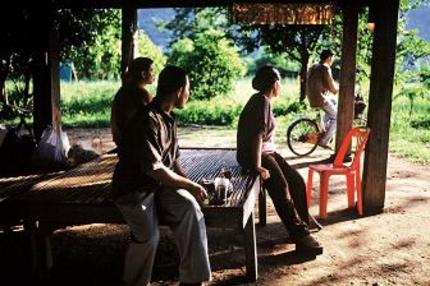LIFF 2010: UNCLE BOONMEE WHO CAN RECALL HIS PAST LIVES review

You could argue winning the Palme D'Or at Cannes might do Uncle Boonmee Who Can Recall His Past Lives more harm than good in some respects. Drawn out, contemplative, enigmatic and ambiguous, it's liable to reaffirm for a lot of people that festival awards mean a film isn't for them, where were they to give it a little more time and forget the media hoopla they might find it slowly winning them over.
With a story loosely based on a true account of a man who arrived at a Thai Buddhist temple claiming to be able to recall memories of his past incarnations, director Apichatpong Weerasethakul continues to tread the same path he's followed through Tropical Malady, Blissfully Yours and beyond. Uncle Boonmee is another dreamy, slightly playful tone poem following a very singular vision with little concern for any kind of commercial audience.
The title character lives at a retreat in the countryside, suffering from renal failure, attended by a faithful male nurse and visited by his sister and nephew. He knows he's dying, but views the end with relative pragmatism, happy he gets to go in the company of people who care about him. Over the course of a single night he's visited by memories, both of people he knew directly - now long dead or missing - or events he's connected to in a more abstract sense.
This probably makes Uncle Boonmee sound far more conventional than turns out to be the case. Weerasethakul is in no hurry to explain anything directly, with the introduction drifting through a leisurely piece of almost wordless scene-setting before we meet Boonmee himself. It's obvious this is a film concerned far more with atmosphere and immersion than anything like a standard three-act story arc; the jungle pulses with life, the soundtrack teeming with background noise.
Weerasethakul hangs on shot after shot for ages, inviting the viewer to mull over what they're seeing. Very little happens, in that Boonmee's guests arrive - the ghost of his wife, say, or his lost son transformed into a forest spirit - they reminisce, then the movie drifts onward. The party prepare to take a last trip into the jungle together, and once they've got there the film briefly turns into a slideshow, still frames flipping past like someone poring through old snapshots as Boonmee readies himself to go.
It prompts any number of questions about what one man's life amounts to, how we treat death or the afterlife and the spiritual versus the physical - nothing out of the ordinary, but phrased with more than enough tact and subtlety they feel more like suggestions than the director forcing a message or messages on the audience.
Yet under the stately, mannered presentation Uncle Boonmee is surprisingly human. It's matter-of-fact, even playful, gently poking fun at the genre trappings it's using. Soon I'll join you in the afterlife, the protagonist earnestly informs his wife's ghost, as if we're about to veer into cloying melodrama; heaven's over-rated, she replies. That's my son you're gawking at, Boonmee informs his nurse, who's just noticed the new arrivals at the table; but that's a monkey, the frightened man answers incredulously.
And though it sends itself up, at times it's also a far more unnerving, genuinely disturbing experience than the viewer might expect. The monkey ghosts may well be lampooning the staples of Thai folklore, and to be honest they rely on an almost comically simple visual gimmick. Yet seeing the jungle by night suddenly dotted with glowing red eyes - tiny points of crimson light - that seem to have faded in from nowhere is a more effective scare tactic than the slow reveals in many J-horror productions.
It's unquestionably world class cinema, but is it a world-beater? Perhaps not. Uncle Boonmee does give the impression of being a little too meandering and disconnected. Weerasethakul seems caught somewhere between trying to make sure no-one gets lost - the jokes, the lack of any overt messages - and ploughing forward. The film lacks the drive of an auteur, someone like Terrence Malick, say, and arguably feels worse off for it in some respects. Though Malick's narrow focus can make him seem like an egotist it can also sweep the audience up, transport them in a way Weerasethakul never quite manages.
These
are minor nitpicks, however. Uncle Boonmee might not win too many
people over outside the festival circuit or a quiet home video
release, but it's still a wonderful film. It's not a journey in the
conventional sense, more a long meditation on ideas which are by no
means exclusively Buddhist or religious but presented in a way which
pays respect to both. Weerasethakul might not have realised his idea
quite as effectively as he could have done, but this is still a
marvellous piece of work which - for the right audience - comes
hugely recommended.
(Uncle Boonmee Who Can Recall His Past Lives was screened as part of the 24th Leeds International Film Festival.)







